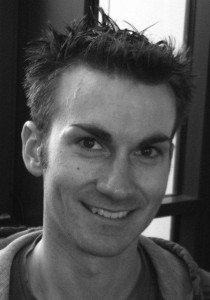
In 2005, Ben Flavel completed a BSc (Nanotechnology) with honours under the supervision of Professor Joe Shapter at Flinders. He then continued his research with Professor Shapter and Associate Professor Jamie Quinton to complete a PhD in chemistry in 2009. During that time he focused on new methods to integrate single-walled carbon nanotubes into molecular electronic devices, namely electrochemical sensors. In 2009 Ben received an Endeavour Research Fellowship from the Australian Government, enabling him to visit the University of Canterbury in New Zealand. Under the supervision of Professor Alison Downard, his research remained focused on carbon nanotubes and electrochemistry, but also began to broaden into the fields of biological interfaces and bio-sensing.
Returning to Flinders in 2010, he worked on a CSIRO funded project aimed at electrochemical detection of waterborne contaminants with carbon nanotube devices. Ben’s interest was coincidently sparked into the use of carbon nanotubes as the light sensitive component for new forms of solar cell devices. At this stage, it became clear that for such an application, extremely high quality carbon nanotube material would be required.
“Fortunately” he says “Professor Krupke and Dr.Hennrich at the Karlsruhe Institute of Nanotechnology in Germany had many years of experience in preparing such material and we began collaborating.” This collaboration led to Ben receiving a postdoctoral research fellowship from the Alexander von Humboldt Foundation and he moved to Germany in 2011. In 2012 he was admitted into the Emmy Noether Programme of the German Research Foundation, which will allow him to build up his own junior research group over the next five years at the Karlsruhe Institute. This award brings with it almost AUD2M and his work will focus on creating new light harvesting devices (solar cells) and bio-sensors from carbon nanotubes. This program is internationally competitive, very prestigious, and aimed at promoting excellent young scientists.
Ben adds that “Flinders University has always played a key role in my scientific career and even now I continue to collaborate with Mr Daniel Tune, a PhD student near to completion, and the group of Professor Shapter.” He also now jointly supervises an additional PhD student Ms. Kate Moore. He says that this collaboration has always been hugely successful and has lead to a vast number of publications.

